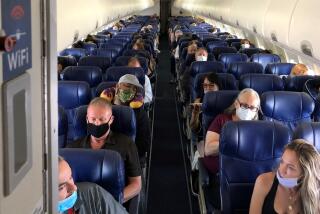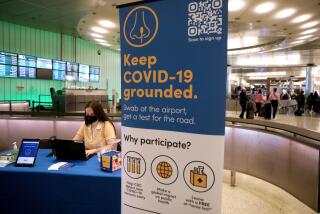Steps for air safety bring health worries
The increased security measures that followed a botched Christmas Day terrorist attack mean airline passengers will face more restrictions, searches, screenings and delays. But now some medical experts and others wonder whether the added precautions could create new health risks for fliers.
To thwart airline terrorist attacks, the Transportation Security Administration plans to deploy about 450 new full-body imaging units at airports throughout the country. The units use low-level X-rays to develop what look like naked images of the passengers passing through. Another, similar device used at 19 airports around the nation -- including Los Angeles International Airport -- uses low-level radio waves to produce its images.
And passengers may endure even more security measures. On Thursday, President Obama directed the Department of Homeland Security to pursue “enhanced screening technology” at airports while preserving privacy rights and civil liberties. The latest airline scare took place Friday when an AirTran Airways flight from Atlanta to San Francisco was diverted and escorted by two U.S. F-16 fighter jets because a passenger verbally abused a flight attendant and locked himself in a bathroom.
With more advanced screening devices at airports come new concerns about the potential health effects on passengers before boarding as well as after they are seated. Despite such fears, the American College of Radiology and the National Council on Radiation Protection and Measurements have both concluded that exposure to either screening device creates no significant danger to passengers.
TSA officials say the amount of energy or radiation emitted by the screeners is much lower than what passengers are exposed to by simply flying on an airplane or using a cellphone.
But it’s not just the screening devices that prompt worries.
After the Christmas Day incident, the TSA gave airline crews the discretion to bar passengers on international flights to the U.S. from getting out of their seats for one hour before the planes land.
Passengers who are overweight, have a history of blood clotting or are recovering from surgery face a greater risk of deep-vein thrombosis when they sit in a cramped airline seat for too long, which can hamper blood flow to the legs, said Peter Lawrence, chief of vascular surgery at the Ronald Reagan UCLA Medical Center.
A thrombosis occurs when a clot forms in a vein, leading to pain and swelling. If the clot breaks loose, it can travel to the lungs and cause a pulmonary embolism, he said.
If passengers are confined to their seats for long hours, Lawrence said they should try to flex their feet and calves to get blood flowing.
“The longer you are inactive the more risk,” he said. “One hour by itself is probably not a great risk, but nobody knows for sure.”
Although the one-hour confinement may not be a serious health risk for the 25 million Americans who suffer from incontinence, it could be a matter of serious embarrassment, said Steve Goelman, chief executive of Unique Wellness, a New York company that makes absorbent adult briefs.
He said the number of people with bladder control problems is growing as baby boomers age.
“This is a growing concern,” Goelman said.
“The security measures could put a heavy burden on those traveling.”
A spokesman for the country’s largest airlines said flight crews would use their discretion when imposing the new security measures on passengers with medical problems.
“The carriers will be sensitive to the special needs of customers,” said David Castelveter, a spokesman for the Air Transport Assn., which represents most major carriers in the U.S.
* After the failed terrorist attack, airline and tourism groups predicted that hassles over increased airport security measures could lead to a drop in travel demand, further harming a floundering travel and tourism industry.
It seems that most of those fears may be unfounded.
A vast majority of companies -- 81% -- surveyed by the National Business Travel Assn. said they would not cut back on business travel as a result of the attempted terrorist attack. Only 2% of the 152 travel managers who took the survey said they would reduce international travel because of the incident, and none said they would reduce domestic travel. Sixteen percent said they were still evaluating the situation before deciding.
Of those surveyed, 43% said the incident raised new concerns about the safety of air travel, whereas 42% said it did not.
Business travel is crucial to the survival of the airline, hotel and tourism industries in the U.S. The travel managers who were surveyed oversee corporate travel budgets averaging more than $16 million
“The survey results are right in line with what we’ve seen in the past with attempted attacks and changes in security protocols,” said NBTA President Craig Banikowski. “These incidents prompt a lot of important discussion and analysis but don’t significantly alter corporate travel patterns, because travel is the lifeblood of so many businesses.”
A ‘hybrid’ hotel
With the growing popularity of hybrid cars today, is it any wonder that a Japanese company has opened a “hybrid” hotel in Torrance, sandwiched between the U.S. headquarters for Honda and Toyota?
Kintetsu Corp. opened the Miyako Hybrid Hotel in December with an eye toward serving Japanese business travelers who visit the two auto manufacturing headquarters.
By now most Americans know the definition of a hybrid car. But a hybrid hotel?
The 208-room hotel -- the first Miyako hybrid and one of only four Miyako hotels in the U.S., including one in downtown Los Angeles -- is called a “hybrid” because the hotel strives to be energy efficient, with 97 rooftop solar panels, providing about 5% of the hotel’s energy. The shampoo bottles in the bathrooms are biodegradable, the hot water comes from tankless water heaters, and even the staff uniforms are made from recycled material.
To save energy, a device near the front door of every room turns off the lights, heating and air conditioning when a guest removes a room key from the gadget.
But the name also reflects the attempt to combine the amenities of a Japanese corporate hotel and an American boutique hotel.
The hotel bathrooms feature deep-soak, 79-gallon bathtubs with adjacent showers, and toilets with heated seats. When the hotel’s Ganban-Yoku spa opens next month, it will offer bedrock baths, in which guests lie on heated mineral stones to detoxify and rejuvenate the skin.
Of course, the hotel also serves the love of technology that Americans and Japanese share. Each room provides iPod docking stations, free wireless Internet and flat-screen TVs that range from 46 to 52 inches.
Said hotel manager Cherie Davis: “What we are trying to do is combine East and West cultures.”
More to Read
Sign up for Essential California
The most important California stories and recommendations in your inbox every morning.
You may occasionally receive promotional content from the Los Angeles Times.










